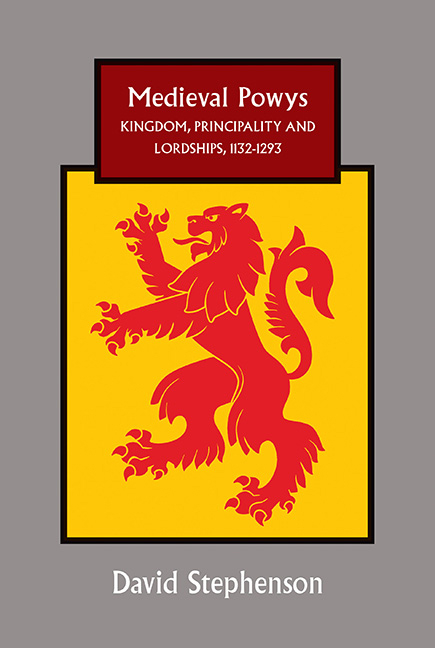Book contents
- Frontmatter
- Dedication
- Contents
- List of Illustrations
- Acknowledgements
- Abbreviations
- Map
- Miscellaneous Frontmatter
- Introduction: The problem of medieval Powys: historiography and sources
- Part I Powysian Polities in the Twelfth and Thirteenth Centuries: A Political Narrative
- Part II Characteristics of the Powysian Polities: Structures, Fault-Lines and Political Culture
- Appendices
- Appendix I The Combermere charters: a new analysis and some implications
- Appendix II Two alleged charters of Elise ap Madog
- Appendix III ‘Powys Fadog’ and ‘Powys Wenwynwyn’
- Appendix IV The date of composition of Breuddwyd Rhonabwy
- Select bibliography
- Index
- Miscellaneous Endmatter
Appendix I - The Combermere charters: a new analysis and some implications
from Appendices
Published online by Cambridge University Press: 29 April 2017
- Frontmatter
- Dedication
- Contents
- List of Illustrations
- Acknowledgements
- Abbreviations
- Map
- Miscellaneous Frontmatter
- Introduction: The problem of medieval Powys: historiography and sources
- Part I Powysian Polities in the Twelfth and Thirteenth Centuries: A Political Narrative
- Part II Characteristics of the Powysian Polities: Structures, Fault-Lines and Political Culture
- Appendices
- Appendix I The Combermere charters: a new analysis and some implications
- Appendix II Two alleged charters of Elise ap Madog
- Appendix III ‘Powys Fadog’ and ‘Powys Wenwynwyn’
- Appendix IV The date of composition of Breuddwyd Rhonabwy
- Select bibliography
- Index
- Miscellaneous Endmatter
Summary
Charters ostensibly granted to Combermere abbey by the rulers of northern Powys, Owain ap Gruffudd Maelor, Madog ap Gruffudd Maelor and Gruffudd ap Madog of Bromfield, have been designated as spurious by Huw Pryce. The grounds for so regarding them are clear: the texts are preserved in a recitation of an inspeximus charter of Edward I dated at Woodstock, 13 May 1287, a period when that king was actually in Gascony. The inspeximus was presented for confirmation in 1331, together with another spurious inspeximus charter purporting to have been issued by Edward I and with other charters with which the Combermere monks had tampered. It is therefore tempting to see the grants to Combermere by Welsh lords as fabrications concocted for insertion into the spurious inspeximus, in order to bolster the abbey's evidently precarious financial position. Nevertheless it is important to consider, as Pryce does, ‘whether there was any genuine basis to the charters’. Pryce groups the three Combermere charters that purport to have been issued by rulers of northern Powys, Owain ap Gruffudd (d. 1197), Madog ap Gruffudd (d. 1236) and Gruffudd ap Madog (d. 1269), with the charter in the name of Gwion ap Jonas (active in the later twelfth and early thirteenth centuries). Gwion was a son of Jonas de Powys, and nephew of the more celebrated Roger de Powys. Gwion's charter makes the initial grant of tithes of fish from the Dee in the lordship of Overton (Maelor Saesneg) to Combermere, which is amplified and extended to Bromfield (Maelor Gymraeg) in the three rulers’ grants. It is certainly the case that some of the phraseology of the charters is unusual, such as the obligation of the keeper of the fishery to render the tithe fairly, ‘as God sends the fish’, or the provision in the charter of Madog ap Gruffudd that if the monks should come to his land they should be received with great honour. On the basis of these and other features that ‘excite suspicion’, Pryce concludes that none of the rulers’ charters – and by extension, presumably, that of Gwion ap Jonas, can be accepted as authentic. This is an eminently reasonable and convincing conclusion.
And yet it is difficult to avoid the suspicion that important elements of these Combermere charters may have some basis in fact. Pryce acknowledges, for example, the possibility that the witness-lists may have been incorporated from authentic documents.
- Type
- Chapter
- Information
- Medieval PowysKingdom, Principality and Lordships, 1132-1293, pp. 293 - 299Publisher: Boydell & BrewerPrint publication year: 2016

